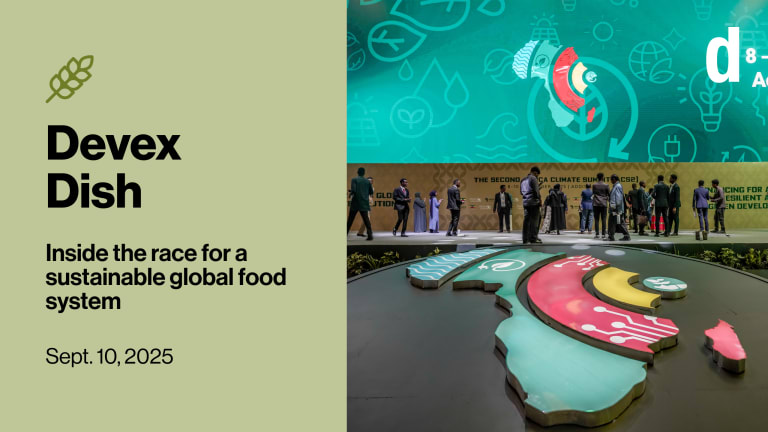
DUBAI, United Arab Emirates — The 2018 United Nations World Data Forum has concluded with new commitments and partnerships to push forward an agenda that will enable data to better support the delivery of the Sustainable Development Goals.
While there were some notable achievements, there were also challenges. Devex has the key takeaways from the three days of discussion.
The Dubai Declaration
The final day of the forum saw the Dubai Declaration finalized. Stefan Schweinfest, director of the U.N. Statistics Division, said that it highlighted the spirit of discussion from the three days of the forum.
The declaration provides a rededication and commitment to the Cape Town Global Action Plan, a focus on implementation and practical solutions, and funding and financing to build the capacity of countries to support the development of better data.
Making the invisible visible: Insights from the UN World Data Forum
Invisible population groups in data are commonly the most vulnerable — women and girls, people with disability, refugees and migrants, and the elderly.
It highlights the need to commit to improving the detail that can be generated from the data — including insights by gender, age, disability, geography, and other factors that can help identify the most vulnerable.
And, Schweinfest said, the declaration requires countries to “broaden the envelope” of funding data programs and look at how they can better use domestic and international resources — including a new funding mechanism created under the mandate of the U.N. Statistical Commission.
Standardizing interoperability
Sharing and combining data across organizations is a key step to making data more useful. As part of day one of the forum, a new guide was launched to provide the base level guidance agencies need to enable their data to work better with other data sets.
The first World Data Forum identified the need for this guidance, which was developed for the second. Many expect that a third forum will showcase how users are implementing the guidelines with partner organizations to deliver smarter and more effective development outcomes.
Satellite data for the SDGs
The use of satellite imagery is the big data making inroads to support sustainable development. NASA, Esri, and DigitalGlobe were among the organizations highlighting the potential to assist developing countries in improving their baseline demographic data by combining it with the insights that can be generated through analysis of satellite imagery, aerial photography, and geospatial technology.
Solutions to the big data challenge at the UN World Data Forum
Big data projects barely go beyond the pilot phase into sustainable development — but the U.N. World Data Forum has seen solutions to help achieve the SDGs.
Mapping settlements, monitoring the environment, supporting disaster recovery, monitoring migration patterns, and analyzing land use are among the ways satellite data is currently being used to improve knowledge and deliver more effective programming.
With a population and housing census coming up in 2020, such data is considered an important asset for countries to help validate and add value to the data they are collecting.
Freely available Landsat data from NASA, for instance, which provides satellite imagery across time to see how the environment changes, is an important asset for developing countries. And the analytical platforms being developed as part of the U.N. Global Working Group on Big Data are aiming to provide tools that can convert the images to information for policymaking.
Political will still lacking
The need for high-level political participation was considered critical to achieving better progress on data — something the forum has not yet achieved, with the belief that it was a place for technical experts rather than decision-makers.
Building political will is crucial to investing in national capabilities to deliver better quality data, as well as to use it to develop programs and policies targeting the most vulnerable.
Making the forum relevant to high-level decision-makers and using the forum as a platform to confirm country commitments to action will be important in making the forum move beyond a gathering of data experts.
The road to Bern
Switzerland’s Bern was announced as host of the 2020 U.N. World Data Forum, and work to organize the third forum began with meetings on the day following the close of the Dubai forum.
While this second forum was successful in bringing groups together to foster collaboration and learn from each other, there are still shortcomings — including political will — that will need to be addressed to achieve better data outcomes for the SDGs.
The availability of funding meant some countries were unable to attend in Dubai. And given the additional visa requirements in Switzerland, some delegates voiced concerns that the next host city could create more barriers to participation.
The next generation
The forum also should encourage a younger audience, said Nnenna Nwakanma, policy director of the World Wide Web Foundation, noting that most attendees were reaching retirement age.
The next generation, she said, would be critical to pushing the agenda forward — and needed to be a part of the discussion and process. Despite the forum’s aim to bring data experts together, it was still dominated by public sector statisticians, meaning new voices and ideas were not being effectively incorporated into the discussion.
At the final day’s program committee assessment meeting, Farah Choucair, project manager of the Arab Development Portal, said work also still needed to be done to make data “attractive and sexy” to more people. And delivering data-driven advocacy will be a priority for Bern.
Lisa Cornish attended the U.N. World Data Forum as a Data2X press fellow.








